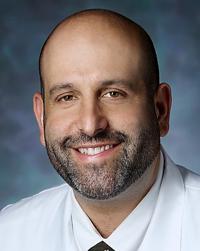Research Lab Results
-
Kass Lab
Basic science investigations span an array of inquiries, such as understanding the basic mechanisms underlying cardiac dyssynchrony and resynchronization in the failing heart, and beneficial influences of nitric oxide/cGMP/protein kinase G and cGMP-targeted phosphdiesterase signaling cascades on cardiac maladaptive stress remodeling. Recently, the latter has particularly focused on the role of phosphodiesterase type 5 and its pharmacologic inhibitors (e.g. sildenafi, Viagra®), on myocyte signaling cascades modulated by protein kinase G, and on the nitric oxide synthase dysregulation coupled with oxidant stress. The lab also conducts clinical research and is presently exploring new treatments for heart failure with a preserved ejection fraction, studying ventricular-arterial interaction and its role in adverse heart-vessel coupling in left heart failure and pulmonary hypertension, and testing new drug, device, and cell therapies for heart disease. A major theme has been with the use of advanced non-invasive and invasive catheterization-based methods to assess cardiac mechanics in patients.asive and invasive catheterization-based methods to assess cardiac mechanics in patients. David Kass, MD, is currently the Director at the Johns Hopkins Center for Molecular Cardiobiology and a professor in cellular and molecular medicine. -
Lisa Maragakis Lab
Researchers in the Lisa Maragakis Lab are interested in health care-acquired infections and antimicrobial-resistant Gram-negative bacilli. We are particularly interested in the epidemiology, prevention and management of these infections.
-
Lana Lee Lab
The Lana Lee Lab works to create successful patient-centered care strategies for young individuals living with HIV. We focus in particular on decision making in HIV treatment for youth and on the availability of services for young people living with HIV in the United States and Uganda.
-
Lakshmi Santhanam Lab
Investigators in the Lakshmi Santhanam Lab examine the fundamental mechanisms behind cardiovascular disease. They are particularly interested in better understanding how nitric oxide-mediated S-nitrosylation (a post-translational protein modification) impacts protein function and trafficking in the vasculature as well as how this relationship influences matrix remodeling and vascular stiffening.
-
Laboratory of Vestibular NeuroAdaptation
The Laboratory of Vestibular NeuroAdaptation investigates mechanisms of gaze stability in people with loss of vestibular sensation. A bulk of our research investigates motor learning in the vestibulo-ocular reflex (VOR) using different types of error signals. In addition, we investigate the synergistic relationship between the vestibular and saccadic oculomotor systems as trainable strategies for gaze stability. We are particularly interested in developing novel technologies to assess and deliver improved rehabilitation outcomes. We are validating a hand-held computer tablet for assessment of sensorimotor function and participating in a clinical trial comparing traditional vestibular rehabilitation against a device developed in our laboratory that can unilaterally or bilaterally strengthen the VOR. Members of the lab include physical therapists, physicians, engineers, statisticians and post-doctoral fellows. The laboratory is supported by generous grant funding from NASA, the NIH, the DOD and grateful patients -
Lonny Yarmus Lab
Clinical trials conducted in the Lonny Yarmus Lab focus primarily on minimally-invasive diagnostic testing for patients with lung cancer and local therapy options for malignant airway obstructions. We investigate ways to improve the early diagnosis of lung cancer, as well as the treatment of later-stage cancer, using the least invasive methods possible. We are also part of the LIBERATE clinical study for patients who have difficulty breathing and suffer from severe emphysema.
-
Leonard Feldman Lab
Research in the Leonard Feldman Lab is focused on consult medicine, high-value care and medical education, including resident training and online curriculum. Past studies include integrating lessons on respect and courtesy toward patients into the training of residents and the impact of including the cost of medical procedures when residents ordered tests.
-
Lee Bone Lab
Research in the Lee Bone Lab uses community-based participatory approaches to promote health in underserved urban African-American populations. We conduct randomized clinical trials on cardiovascular disease, diabetes and cancer detection and control in order to test the success of community interventions. We focus in particular on making interventions sustainable and on implementing electronic education to improve communication.
-
Laura Hummers Lab
The Laura Hummers Lab participates in a number of clinical trials and clinical investigations at the Scleroderma Center at Johns Hopkins. We have a particular interest in the predictors of outcomes in scleroderma. We’ve established a prospective cohort of 300 scleroderma patients to identify incident vascular outcomes in the hopes of identifying new biomarkers for disease development and progression. -
Nada Alachkar Lab
Dr. Alachkar's research focuses on recurrent glomerular diseases post kidney transplantation. In particular, she has been studying recurrent FSGS post kidney transplant in several, partially NIH funded, prospective research projects that focuses on circulating factors associate with recurrent FSGS and new therapies of recurrent FSGS; in addition to the outcome of the disease. Also, Dr. Alachkar is the Chair of Banff recurrent GN working group that focus on the pathological changes of recurrent GN.
Dr. Alachkar's other research focus is incompatible living and diseases donor transplant. She has several ongoing research studies that focus on AMR and the outcome of patients with positive donor specific antibodies.


